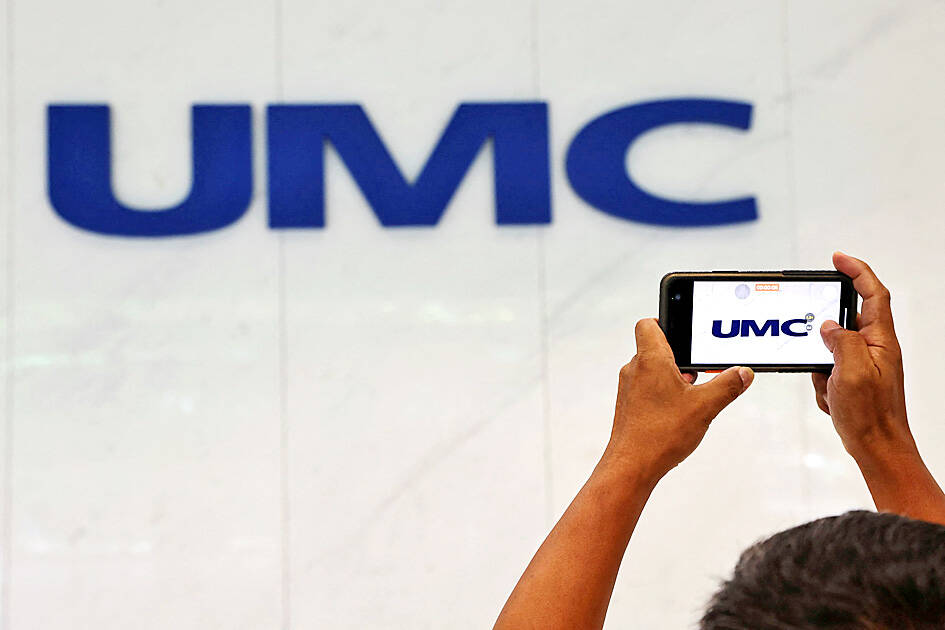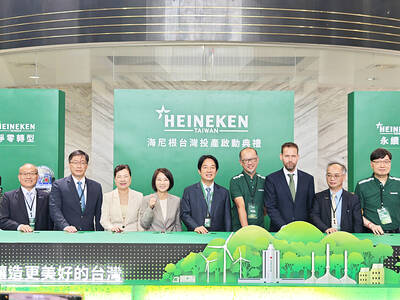United Microelectronics Corp (UMC, 聯電), the world’s third-largest foundry services provider, yesterday said that factory utilization this quarter would fall to 70 percent, the lowest in 10 years, due to a prolonged inventory correction cycle driven by sagging end-product demand from PCs and smartphones.
The Hsinchu-based chipmaker expects 28-nanometer technology to be the bright spot, with much higher utilization than the corporate average. The 28-nanometer technology and the 22-nanometer technology were its largest revenue contributors last quarter with a 28 percent share.
Overall factory utilization last quarter dropped to 90 percent from 100 percent in the previous quarters.

Photo: Ann Wang, Reuters
With the downtrend in equipment loading extending into the current quarter, UMC expects gross margin to fall to about 35 percent this quarter, compared with 42.9 percent last quarter.
Wafer shipments are to plummet 17 to 19 percent sequentially this quarter, the chipmaker said.
Average selling prices would be flat this quarter and remain firm through this year, thanks to long-term supply agreements with customers, it said.
Only a few customers breached the agreements and faced penalties, it added.
“Given a soft global economic outlook for 2023, we expect the current challenging environment to persist through the first quarter, as customers’ inventory turnover days are still higher than normal, while order visibility remains low,” company president Jason Wang (王石) told investors during a virtual conference.
“We expect the inventory situation to gradually improve with better visibility in the second half of 2023,” Wang said. “We hope the first quarter will be the trough.”
UMC plans to spend US$3 billion on new facilities and manufacturing equipment to expand 12-inch wafer production at its 12A P3 fab in Tainan and P6 fab in Singapore.
Some capacity at the fabs have been booked by customers.
New capacity from the Tainan fab would come online in the third quarter and the P6 fab would begin volume production in the first half of 2025, UMC said.
This year’s capital budget is slightly higher than last year’s US$2.7 billion, but the chipmaker said that it would adjust spending in response to market changes.
This year “will be a down year for semiconductors and foundries, due to deterioration in the global economy and weakening consumer demand,” Wang said.
The global semiconductor industry would see revenue drop by a low-single digit percentage, while the foundry sector would see a 5 percent decline annually, he said.
The decline would be even more drastic for UMC’s addressable market with about 12 percent, or 13 percent on an annual basis, Wang said.
Commenting on the effects of geopolitical tensions, UMC said it would benefit from concerns over supply disruptions.
Some customers are in discussions with UMC to fulfill their capacity sourcing plans, Wang said.
UMC saw net profit contract 29.4 percent to NT$19.07 billion (US$630 million) in the fourth quarter of last year, compared with NT$26.99 billion in the third quarter. On an annual basis, net profit rose 19.6 percent from NT$15.95 billion.
For the whole of last year, net profit soared 56.3 percent year-on-year to NT$87.19 billion, from NT$55.78 billion in 2021. Earnings per share jumped to NT$7.09 from NT$4.57.
Overall revenue increased 30.8 percent to NT$278.71 billion last year, with sales of auto chips posting the fastest growth rate at 82 percent.
Revenue contribution from auto chips rose to 9 percent of overall revenue last year, the company said.

purpose: Tesla’s CEO sought to meet senior Chinese officials to discuss the rollout of its ‘full self-driving’ software in China and approval to transfer data they had collected Tesla Inc CEO Elon Musk arrived in Beijing yesterday on an unannounced visit, where he is expected to meet senior officials to discuss the rollout of "full self-driving" (FSD) software and permission to transfer data overseas, according to a person with knowledge of the matter. Chinese state media reported that he met Premier Li Qiang (李強) in Beijing, during which Li told Musk that Tesla's development in China could be regarded as a successful example of US-China economic and trade cooperation. Musk confirmed his meeting with the premier yesterday with a post on social media platform X. "Honored to meet with Premier Li

Dutch brewing company Heineken NV on Friday announced an investment of NT$13.5 billion (US$414.62 million) over the next five years in Taiwan. The first multinational brewing company to operate in Taiwan, Heineken made the statement at a ceremony held at its brewery in Pingtung County. It also outlined its efforts to make the brewery “net zero” by 2030. Heineken has been in the Taiwanese market for 20 years, Heineken Taiwan managing director Jeff Wu (吳建甫) said. With strong support from local consumers, the Dutch brewery decided to transition from sales to manufacturing in the country, Wu said. Heineken assumed majority ownership and management rights

coverage expansion: The industrial PC maker has proposed to acquire 3.938 million Aures shares to strengthen its global smart retail presence Leading industrial PC maker Advantech Co (研華) plans to acquire Aures Technologies SA, a French company known for its point-of-sale (POS) and kiosk equipment, to expand its global coverage in smart retail products and services. Advantech proposed to acquire 3.938 million Aures shares from the French firm’s major shareholder and through a public tender offer at up to 6.7 euros per share, the PC maker said in a statement after announcing the deal at the Taiwan Stock Exchange late on Friday. The company aims to acquire up to 100 percent equity of Aures, a well-known brand in the western market with a

Microsoft Corp yesterday said that it would create Thailand’s first data center region to boost cloud and artificial intelligence (AI) infrastructure, promising AI training to more than 100,000 people to develop tech. Bangkok is a key economic player in Southeast Asia, but it has lagged behind Indonesia and Singapore when it comes to the tech industry. Thailand has an “incredible opportunity to build a digital-first, AI-powered future,” Microsoft chairman and chief executive officer Satya Nadella said at an event in Bangkok. Data center regions are physical locations that store computing infrastructure, allowing secure and reliable access to cloud platforms. The global embrace of AI